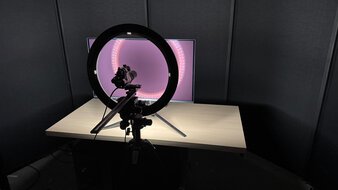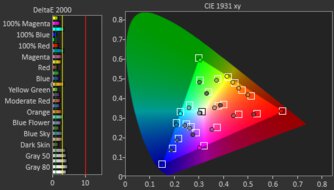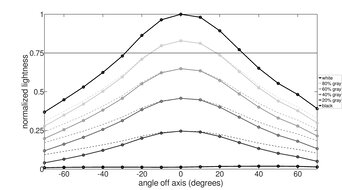The gaming monitor market is continuously growing, with plenty of options to choose from. There are different factors you'll have to consider when looking for a new gaming monitor, like the refresh rate and resolution. There's no perfect solution for everyone with these, and you have to consider the types of games you play. For example, competitive PC gamers may prefer higher refresh rates and lower resolutions, or you may want a 4k monitor with high-bandwidth ports for more detailed games. There are even high-resolution, high-refresh-rate displays available, but you need a premium gaming setup to take full advantage of them.
No matter what type of gamer you are, there are a few things you have to look for in a gaming monitor. Having a fast response time for great motion handling is beneficial. Low input lag is also important, but that's the case with most monitors. Having VRR support helps reduce screen tearing, and most monitors support common VRR formats. Lastly, premium monitors usually combine their high-end performance with premium picture quality, particularly in HDR, with deep blacks, bright highlights, and vivid colors. Even some entry-level monitors have good picture quality, but these are less common.
We've bought and tested over 370 monitors, and below, you'll find our recommendations for the best gaming monitors available. See our picks for the best monitors, the best 240Hz monitors, and the best monitor brands. If you want to complete your gaming setup, also check out the best gaming mouse, the best gaming keyboards, and the best gaming headsets.
Quick Look


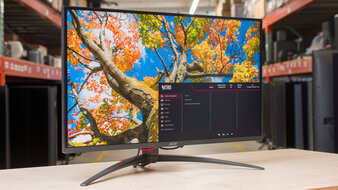


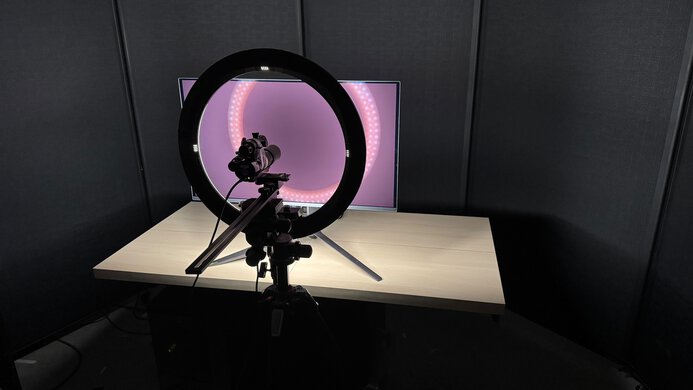
We buy and test more than 30 monitors each year, with units that we buy completely on our own, without any cherry-picked units or samples. We put a lot into each unbiased, straight-to-the-point review, and there's a whole process from purchasing to publishing, involving multiple teams and people. We do more than just use the monitor for a week; we use specialized and custom tools to measure various aspects with objective data-based results. We also consider multiple factors before making any recommendations, including the monitor's cost, its performance against the competition, and whether or not it's easy to find.
-
Best Gaming Monitor
 PC Gaming9.1Console Gaming9.4Response Time9.9HDR Picture9.4SDR Picture10Brightness7.2Size27"Panel TypeQD-OLEDMax Refresh Rate240 HzSee all our test resultsNative Resolution3840 x 2160
PC Gaming9.1Console Gaming9.4Response Time9.9HDR Picture9.4SDR Picture10Brightness7.2Size27"Panel TypeQD-OLEDMax Refresh Rate240 HzSee all our test resultsNative Resolution3840 x 2160The best gaming monitor we've tested is the ASUS ROG Swift OLED PG27UCDM. It's a premium 4k, 240Hz monitor with a QD-OLED panel. It provides both outstanding picture quality and fantastic gaming performance. Motion looks extremely clear thanks to its near-instantaneous response time, so there's almost no blur behind fast-moving objects. It also supports HDMI and DisplayPort 2.1 bandwidth to take full advantage of modern graphics cards and consoles. Additionally, it features some notable extras, including Dolby Vision support, a USB-C port that supports DisplayPort Alt Mode, and a KVM switch.
Its QD-OLED panel delivers perfect blacks in dark rooms without any haloing around bright objects, and colors are vivid. It also gets bright enough to fight most glare in most well-lit rooms, but keep in mind that blacks look purple in bright rooms as the black levels rise. You can check out the ASUS ROG Strix OLED XG32UCWMG if you want a 4k, 240Hz OLED whose black levels remain low in bright rooms. It also has a dual-mode feature that boosts the refresh rate to 480Hz with a lower 1080p resolution. However, the XG32UCWMG lacks some features the PG27UCDM has, like DisplayPort 2.1 and Dolby Vision, and colors aren't as vivid, so the PG27UCDM is more well-rounded.
-
Best Upper Mid-Range Gaming Monitor
 PC Gaming9.2Console Gaming9.1Response Time9.8HDR Picture9.5SDR Picture10Brightness7.2Size27"Panel TypeQD-OLEDMax Refresh Rate360 HzSee all our test resultsNative Resolution2560 x 1440
PC Gaming9.2Console Gaming9.1Response Time9.8HDR Picture9.5SDR Picture10Brightness7.2Size27"Panel TypeQD-OLEDMax Refresh Rate360 HzSee all our test resultsNative Resolution2560 x 1440If you don't need a premium option with a high 4k resolution like the ASUS ROG Swift OLED PG27UCDM, check out the lower-end ASUS ROG Strix OLED XG27ACDNG instead. The main difference is that it has a lower 1440p resolution, so images aren't as detailed, and text isn't as sharp. That said, it features a higher 360Hz refresh rate, which is ideal for competitive gaming, and the lower resolution allows your graphics card to maintain high frame rates more easily.
Besides that, and the fact that it doesn't support Dolby Vision like the PG27UCDM, it's very similar in terms of features. It also features HDMI 2.1 bandwidth to take full advantage of modern gaming consoles, but lacks DisplayPort 2.1 bandwidth. It even performs similarly, with bright and vivid colors to go alongside sharp motion. Plus, it has deep and inky blacks in dark rooms, but like any QD-OLED, blacks look purple in bright rooms. The LG 27GX700A-B is an alternative for use in bright rooms, as it achieves significantly brighter visuals thanks to its RGB Tandem OLED panel, while maintaining low black levels in these environments. However, it has a lower refresh rate and has some issues, like banding in dark scenes.
-
Best Mid-Range Gaming Monitor
 PC Gaming7.7Console Gaming8.5Response Time7.5HDR Picture6.8SDR Picture7.1Brightness8.7Size27"Panel TypeIPSMax Refresh Rate320 HzSee all our test resultsNative Resolution3840 x 2160
PC Gaming7.7Console Gaming8.5Response Time7.5HDR Picture6.8SDR Picture7.1Brightness8.7Size27"Panel TypeIPSMax Refresh Rate320 HzSee all our test resultsNative Resolution3840 x 2160If the ASUS ROG Strix OLED XG27ACDNG is still too much out of your price range, there are some great mid-range options you can consider, like the Acer Nitro XV275K P5biipruzx. It differs from both the XG27ACDNG and the ASUS ROG Swift OLED PG27UCDM in that it lacks an OLED panel, resulting in poorer picture quality. It has a Mini LED local dimming feature that turns on in HDR to make it incredibly bright and improve the picture quality with deeper blacks in dark scenes. However, it's far from perfect, as there's haloing around bright objects, and it has black crush. The picture quality is significantly worse in SDR, as you cannot utilize this local dimming feature.
While it doesn't have the same near-instantaneous response time as the XG27ACDNG and PG27UCDM, motion still looks good. Its response time remains consistently fast at any refresh rate. It also has a native 4k resolution and 160Hz refresh rate that you can change to 1080p, 320Hz, so it's versatile for playing different types of games. Plus, it has HDMI 2.1 bandwidth to support most signals from gaming consoles. Overall, despite some drawbacks, it still offers solid gaming value at its price point, especially when it can be found on sale.
-
Best Budget Gaming Monitor
 PC Gaming8.2Console Gaming7.4Response Time8.5HDR Picture8.0SDR Picture8.2Brightness8.3Size27"Panel TypeVAMax Refresh Rate180 HzSee all our test resultsNative Resolution2560 x 1440
PC Gaming8.2Console Gaming7.4Response Time8.5HDR Picture8.0SDR Picture8.2Brightness8.3Size27"Panel TypeVAMax Refresh Rate180 HzSee all our test resultsNative Resolution2560 x 1440As you get into budget monitors, you get fewer features than with high-end models, but some still offer good gaming performance and picture quality. That's the case with the AOC Q27G3XMN, one of the few low-cost monitors with Mini LED backlighting, similar to the Acer Nitro XV275K P5biipruzx. It actually has better picture quality than the Acer because its local dimming feature is more effective at improving the picture quality with less haloing around bright objects. You can also turn it on in SDR, so it has great picture quality whether you game in SDR or HDR.
However, there are a few trade-offs versus the Acer, which is what you can expect from a budget monitor. It has a lower 1440p resolution, so images are less sharp, and you can't boost its 180Hz refresh rate to anything further like on the Acer. It also lacks HDMI 2.1 bandwidth, so it can't make full use of gaming consoles. While it has a fast response time, it has some black smearing, which is one of the downsides of its VA panel. If this doesn't bother you, you can also check out the similar AOC Q27G40XMN if you can find it available in your region. It performs similarly for the most part and even has better local dimming, but it has worse motion handling.
-
Best Cheap Gaming Monitor
 PC Gaming7.0Console Gaming5.1Response Time7.5HDR Picture4.8SDR Picture6.5Brightness7.0Size24"Panel TypeIPSMax Refresh Rate180 HzSee all our test resultsNative Resolution1920 x 1080
PC Gaming7.0Console Gaming5.1Response Time7.5HDR Picture4.8SDR Picture6.5Brightness7.0Size24"Panel TypeIPSMax Refresh Rate180 HzSee all our test resultsNative Resolution1920 x 1080If you're on a tight budget and you need a simple and cheap gaming monitor, check out the LG 24GS65F-B. It's smaller and has a lower resolution than the AOC Q27G3XMN, so it doesn't offer the same immersive gaming experience. However, this is what you can expect at this price point. It also has worse picture quality than the AOC because it lacks a local dimming feature and has a low contrast ratio, so blacks look gray and highlights don't pop when gaming in HDR.
Despite worse picture quality, it still offers the basics for gaming. It features a 180Hz refresh rate with VRR support, reducing screen tearing. It also has a consistent response time across its VRR range, so motion looks sharp for the most part, and it has less black smearing than the AOC. While it's a decent choice for PC gaming, one of its downsides is that it has limited compatibility with consoles. If you want an option that supports more signals from consoles, you can also check out the 1440p MSI G274QPF-QD. However, it sometimes costs more than the LG and has slightly worse motion handling.
Notable Mentions
-
Dell Alienware AW2725Q:
The Dell Alienware AW2725Q is a 4k, 240Hz QD-OLED that's a cheaper alternative to the ASUS ROG Swift OLED PG27UCDM. It performs similarly but has fewer features, as it lacks DisplayPort 2.1 bandwidth and a KVM switch. That said, it's still worth considering if you don't need the features on the ASUS.
See our review -
ASUS ROG Swift OLED PG32UCDM:
The ASUS ROG Swift OLED PG32UCDM is a premium 4k, 240Hz QD-OLED that's a larger alternative to the ASUS ROG Swift OLED PG27UCDM if you want something bigger. It performs similarly for the most part, but it lacks DisplayPort 2.1 bandwidth like the PG27UCDM.
See our review -
Gigabyte AORUS FO27Q3:
The Gigabyte AORUS FO27Q3 competes with the ASUS ROG Strix OLED XG27ACDNG and performs similarly. You can't go wrong with either monitor, especially if you can find them at the same price; however, the Gigabyte may be harder to find.
See our review -
LG 27GX790A-B:
The LG 27GX790A-B is a 1440p gaming monitor with a higher refresh rate than the ASUS ROG Strix OLED XG27ACDNG. It's something to consider if you plan to take advantage of a high 480Hz refresh rate, but it has less vivid colors.
See our review -
BenQ MOBIUZ EX321UX:
The BenQ MOBIUZ EX321UX is a 4k, 144Hz Mini LED monitor that's a consideration in the upper mid-range price category if you want something brighter than the ASUS ROG Strix OLED XG27ACDNG. Highlights really pop, but it doesn't display the same deep blacks as an OLED and has a lower refresh rate than the ASUS.
See our review
Recent Updates
Nov 20, 2025:
We replaced the ASUS ROG Strix OLED XG27AQDMG with the Acer Nitro XV275K P5biipruzx because it's cheaper and has a higher 4k resolution. We also replaced the MSI G274QPF-QD with the LG 24GS65F-B for consistency with other recommendations. Lastly, we added the ASUS ROG Swift OLED PG32UCDM to the Notable Mentions.
Aug 15, 2025:
We replaced the Dell G2524H with the MSI G274QPF-QD, as it gets much brighter, displays a wider range of colors, and has a higher resolution. We also removed the ASUS ROG Swift OLED PG32UCDM from the Notable Mentions.
Jul 14, 2025:
We replaced the MSI MPG 271QRX QD-OLED with the ASUS ROG Strix OLED XG27ACDNG because the MSI is hard to find. We also replaced the Acer Nitro XV275K P3biipruzx with the ASUS ROG Strix OLED XG27AQDMG, which has a higher refresh rate and better motion handling. Lastly, we replaced the XG27ACDNG and the Sony INZONE M10S with the LG 27GX790A-B and the BenQ MOBIUZ EX321UX in the Notable Mentions.
May 23, 2025:
We replaced the MSI MPG 321URX QD-OLED with the ASUS ROG Swift OLED PG27UCDM for consistency with other recommendations, as the ASUS has a few extra features. We also added the Dell G2524H as the 'Best Cheap Monitor' to give another option. Lastly, we replaced the Dell Alienware AW3225QF with the Dell Alienware AW2725Q in the Notable Mentions.
Apr 02, 2025:
We removed the LG 27GP850-B/27BP83B-B because it's hard to find. We also replaced the ASUS ROG Strix XG27ACS with the ASUS ROG Strix OLED XG27ACDNG in the Notable Mentions.
All Reviews
Our recommendations are based on what we think are the best monitors for gaming on PCs and consoles currently available. They are adapted to be valid for most people in each price range. The rating is based on our review, factoring in price and feedback from our visitors.
If you'd prefer to make your own decision, here's the list of all of our monitor reviews. Be careful not to get too caught up in the details. Most monitors are good enough to please most people, and the things we fault monitors on are often not noticeable unless you really look for them.

